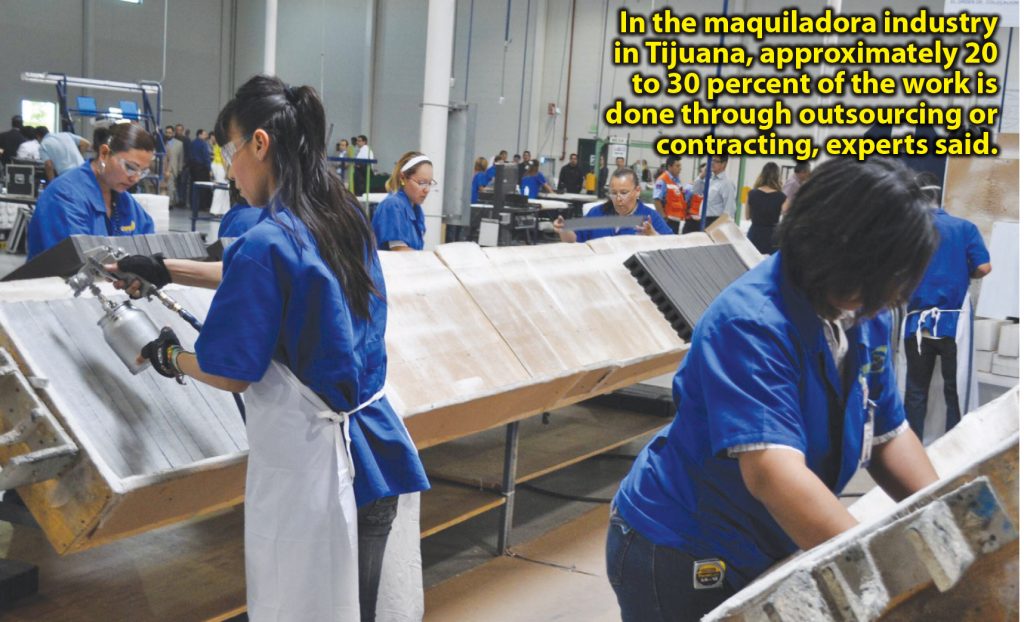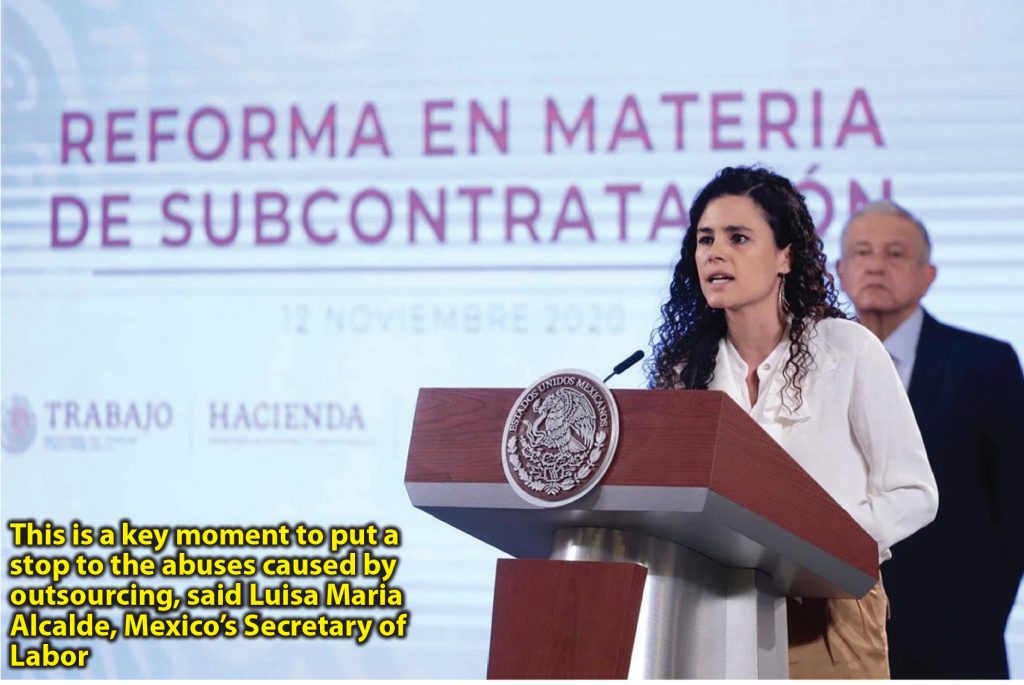Mexico Eyes Penalizing Outsourcing

By Wendy Fry
A federal initiative to penalize outsourcing and subcontracting programs will drastically slow down the economic recovery in Baja California’s manufacturing industry, according to experts and leaders in the field.
Mexico’s President Andrés Manuel López Obrador has submitted a bill to the Senate that would modify the federal tax code to penalize companies that rely on outsourcing. The president has said he is protecting workers’ rights by seeking greater regulation in outsourcing, specialized services and employment agencies.
Experts argued the proposed legislation could have disastrous impacts on the manufacturing industry in Baja California.
“Instead of the government creating some new rules, they could enforce the rules we already have, but instead they are looking to penalize outsourcing as a whole and they’re going to cancel the entire industry,” said Salvador Diaz, the president of Association of Industrialists of Otay Mesa (AIMO for its initials in Spanish.)
Diaz explained the government is trying to regulate companies that cheat on social security taxes by paying employees for only one salary cycle and then listing the rest of their temporary work payments as “bonuses” instead of properly paying taxes for that employment.
“The government already has all the infrastructure in place in order to put fines on those companies. And they know who those companies are that are cheating the system,” he said. “Actually, the federal government hires a lot of people that way – through subcontracting.”
The bill, if left unchanged, could negatively impact some 4.6 million workers across the country, according to the president of the Association of Human Resources and Industry of Tijuana (Arhitac), Heriberto Galindo.

“We have at least 4.6 million employees hired through these means of outsourcing or subcontracting. I believe these methods have come to facilitate a lot of flexibility within organizations,” said Galindo.
The economy in Baja California is very heavily dependent on the maquiladora or manufacturing industry, according to Diaz, and any slow-down in its growth will slow the economic recovery of the region as a whole, he said.
“Right now, around 50 percent of the economy in Baja revolves around the maquiladora industry – around 50 to 60 percent,” he said.
That industry also has a labor need of about 5,000 workers, he added.
“Right now, it is very hard for us here in Baja to find workers. The employee turnover is very high, around 18 percent,” Diaz said.
López Obrador presented the reform initiative recently before the Chamber of Deputies, saying he hoped to “put order” to the practice of subcontracting – which is when a company contracts with a separate company for specialized services or for additional workers to complete a job.
It is a very heavily relied upon practice in Tijuana, especially, for example, when manufacturing companies rapidly shifted gears at the onslaught of the coronavirus pandemic to produce medical supplies and more ventilator parts, experts said.
“For example, when you have a client who suddenly needs more products or new products with new lines of work, and it’s something you need to do very fast, that’s why we need the flexibility of outsourcing because instead of going out to the streets or going to the malls to hire some extra people, we can call these outsourcing companies or employee services and they can provide us with the workers that we need,” said Diaz. “That’s why it’s something that really is going to have an impact.”
López Obrador harshly recently responded to complaints from the business community saying “don’t ask me to become an accomplice” in hurting workers or violating workers’ rights.
Companies avoid paying employee benefits by too heavily relying on the method of subcontracting, the president said. He said the mechanism is considered “spoiled” and not only doesn’t respect workers’ rights, but he added it also amounts to tax fraud.
The current draft initiative must be reformed, according to AIMO, which represents 200 companies in Tijuana with 110 of those being maquiladoras.

Nearly every business – small and large – utilizes subcontracting at some point, said Diaz.
“Okay, so here I am, I am an accountant, and the elevator in my office breaks, and I have no idea how to repair an elevator, as an accountant, so we aren’t sure with the way these new rules read … Are companies going to have to submit paperwork for that and wait one month for approval before they can get their elevator repaired?” Diaz asked.
“We think it’s a mistake, a very big mistake,” he added. His AIMO organization has asked federal senators and legislators to come to Tijuana to see and hear directly from companies about the impact the new legislation may have.
Since 2012, subcontracting has been regulated through the Federal Labor Law in Mexico.
“Subcontracting work is that through which an employer called a contractor who executes work or provides services with his workers under his dependence, in favor of a contractor, individual or legal entity, who sets the tasks of the subcontractor, and supervises him in the development of the services or the execution of the contracted works,” the law states.
Some examples could be legal services that utilize translation services to translate legal documents or who outsource their Information Technology systems. In the manufacturing sector, certain companies handle the administration overhead of hiring and contracting with employees, so those employees are “standing ready” when there are surge demands for products – such as at the beginning of the COVID-19 pandemic when there was a surge in demand for sanitary products like masks and robes for doctors.
In the maquiladora industry in Tijuana, approximately 20 to 30 percent of the work is done through outsourcing or contracting, experts said.
Some companies abuse the system by relying too heavily on outsourcing or hiring most of their staff through an outside company so that they can avoid paying employee benefits.
When those employees are doing the tasks that are directly related to the company’s primary source of income or profit, it becomes a problem, according to industry experts. An example of this would be if a contractor is hired to build an apartment complex, but instead of directly employing the construction labor, he works through an outside company to avoid labor laws.

“At first, the objective was to allow companies to focus on the heart of their business, and not worry about other aspects, but this scheme has been abused and has been used as a means to evade employer responsibilities,” said a labor law attorney, who asked not to be named.
Diaz reiterated that the government should focus on penalizing only the bad actors instead of eliminating the process all together.
The president’s bill specifically seeks to eliminate any employee deductibles for any company that outsources any work. It also prevents them from taking value-added tax credit.
The proposed legislation doesn’t just offer tax penalties or remove tax incentives.
“If the company that has used outsourcing gets the credit or takes the deduction, the penalty could be – in the worst-case scenario – jail,” said Diaz.